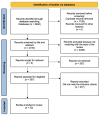The Effects of Physical Exercise on Mental Health: From Cognitive Improvements to Risk of Addiction
- PMID: 34948993
- PMCID: PMC8705508
- DOI: 10.3390/ijerph182413384
The Effects of Physical Exercise on Mental Health: From Cognitive Improvements to Risk of Addiction
Abstract
(1) Background: we aimed to investigate the effects of physical activity on cognitive functions and deficits of healthy population and other needy groups. Secondly, we investigated the relation between healthy habits and psychopathological risks. Finally, we investigated the impact of COVID-19 pandemic on exercise addiction and possible associated disorders. (2) Methods: From April 2021 to October 2021, we conducted a review aimed at identifying the effects of physical exercise on mental health, from cognitive improvements to risk of addiction; we searched for relevant studies on PubMed, Web of Science, EMBASE, PsycINFO and CINHAL. (3) Results: For the first purpose, results indicated multiple effects such as better precision and response speed in information processing tasks on healthy populations; improvement of executive functions, cognitive flexibility and school performance in children; improvement of attention and executive functions and less hyperactivity and impulsiveness on children with attention deficit hyperactivity disorder (ADHD); improvement of executive and global functions on adults; improvement of overall cognitive functioning on patients with schizophrenic spectrum disorder or bipolar disorder. Data also demonstrated that exercise addiction seems to be related to low levels of education, low self-esteem, eating disorders and body dysmorphisms. Eventually, it was found that people with lower traits and intolerance of uncertainty show a strong association between COVID-19 anxiety and compulsive exercise and eating disorder. (4) Conclusions: these findings underline on one side the beneficial effects of physical activity on cognitive function in healthy individuals in a preventive and curative key, while on the other side the importance of an adequate evaluation of psychological distress and personality characteristics associated with exercise addiction.
Keywords: cognitive functions; executive functions; exercise addiction; physical activity; sport addiction.
Conflict of interest statement
The authors declare no conflict of interest.
References
-
- Perciavalle V., editor. Fisiologia Umana Applicata All’attività Fisica. Poletto Editore; Catania, Italy: 2009. Processi cognitivi; p. 168.
Publication types
MeSH terms
LinkOut - more resources
Full Text Sources
Medical
Miscellaneous


